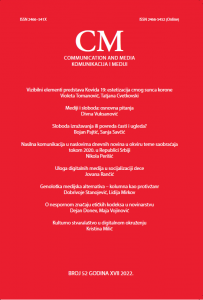Sloboda izražavanja ili povreda časti i ugleda?
FREEDOM OF EXPRESSION OR VIOLATION OF HONOR AND REPUTATION?
Author(s): Sanja Savčić, Bojan PajtićSubject(s): Social Sciences, Communication studies
Published by: Fakultet političkih nauka Univerziteta u Beogradu
Keywords: freedom of expression; dignity of the person; violation of the right to dignity; honor and reputation; media; social networks
Summary/Abstract: In the nature of human beings there is a need for mutual exchange of information, ideas, opinions, knowledge. Telling in a simple language, this is the need for communication. It is not an exaggeration to attribute a much stronger function to communication in modern society. It is the basis for connecting individuals, groups and even social communities. Communication is, in addition, a necessary means of civilizational achievements (as an exchange of knowledge and ideas), but also of social and political changes. Although communication is not a process inherent only in modern society, there is no doubt that its explosive significance in the 21st century is directly related to the emergence of the Internet and, in particular, the various Internet platforms through which it takes place in a fast and cheap way. More importantly, information exchanged over the Internet can be learned by an audience of millions at the same time. Of particular importance in this process of expansion of Internet communication certainly belongs to numerous social networks. Among them, the most popular are certainly Facebook, Instagram, Twitter, TikTok. Today, there is almost no Internet user who is not at the same time a user of some of the planet’s popular social networks. Apart from the advantages of communication in the digital environment and the fact that the Internet has made everyday life much more comfortable, the new era in communication has reopened the question of where the line is between freedom of expression and violation of rights, but also who is responsible for the violation. Although at first glance it may seem that legal science has long given an answer to the questions posed, this paper aims to, by analyzing the case law of the European Court of Human Rights and domestic courts, point out that insufficiently developed legal framework for communication via the Internet can jeopardize the seemingly solid acquis, especially when it comes to the basic rights of man and citizen. We pay special attention to the right to the dignity of the person, i.e. honor and reputation. After analyzing the case law, we will set out the criteria for the delimitation of freedom of expression and the violation of the right to dignity, which provide the necessary legal certainty, especially in times of dominant communication via the Internet.
Journal: CM Komunikacija i mediji
- Issue Year: 17/2022
- Issue No: 52
- Page Range: 201-221
- Page Count: 21
- Language: Serbian

